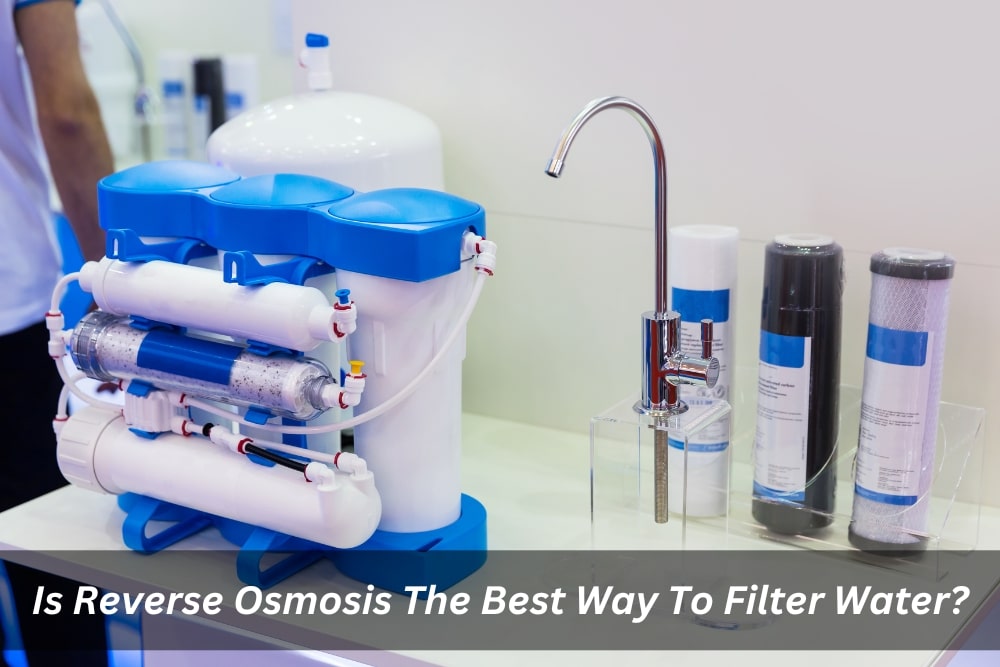A Reverse osmosis water filter has gained significant popularity in recent years as an effective solution for obtaining clean water. When it comes to water filter installation, reverse osmosis systems are often considered a top choice. However, before rushing to get a filter installed, it’s important to weigh the pros and cons. While reverse osmosis filters can remove a wide range of contaminants, their efficiency comes at a cost. In this blog post, we will explore the pros and cons of reverse osmosis water filter systems, shedding light on whether they truly are the best way to filter your sink water for clean, purified drinking water.
What is Reverse Osmosis (RO)?
Reverse Osmosis (RO) is a water filtration technique that uses the best semipermeable membrane to release impurities and contaminants from tap water. This type of water filtration system is commonly used in homes and businesses to provide clean and purified water for drinking and cooking purposes.
The RO process works by applying pressure to the tap water, forcing it through the membrane and leaving behind any dissolved solids, chemicals, and impurities. This results in clean and filtered water that is free from contaminants, providing a healthier and safer option for consumption. Many households install sink water filters that utilise reverse osmosis technology to ensure the quality and safety of their tap water. These sink water filters are convenient and easily accessible, allowing users to have a constant supply of purified water right at their kitchen sink.
Overall, reverse osmosis is an effective water filtration method that helps improve the taste, odour, and overall quality of tap water.
The benefits of Reverse Osmosis Water Filter
- The primary benefit of reverse osmosis is that it’s very effective at removing impurities and contaminants from water. It can remove up to 99% of contaminants, including heavy metals, lead, arsenic, chlorine, nitrates, fluoride, and more.
- Additionally, RO systems are relatively easy to install and maintain.
The drawbacks of Reverse Osmosis Water Filter
However, reverse osmosis water filtration has some associated drawbacks.
- One issue arises because the membrane filters out numerous particles and minerals. Including beneficial minerals like calcium and magnesium, which are important for health. As a result, we can classify the obtained water as “purified” but not necessarily as “healthy.”
- Additionally, RO systems require a fair amount of water waste to operate effectively. They discard about four gallons for every gallon of filtered water produced.
Comparison to Other Water Filtration Techniques
When filtering water, people commonly use several other techniques. These include activated carbon filters, UV filters, and sediment filters.
- Activated carbon filters are effective at removing chlorine and other contaminants from water.
- While UV filters utilise ultraviolet light to eliminate bacteria and viruses in the water supply.
- Sediment filters actively remove larger particles such as sand or silt from the water.
All of these options have their pros and cons, but when comparing them to reverse osmosis, it’s important to consider the efficiency of each system. For instance, sediment filters are very affordable and easy to maintain. But, they are also not as effective at removing certain contaminants like lead or arsenic. Similarly, UV filters can be effective at killing bacteria and viruses. But, they are not as effective at removing other impurities from the water supply.
Which water filtration method do experts consider the best?
When it comes to water filtration, there are several options available and the best one for you will depend on your specific needs. A popular choice is a reverse osmosis water filter. It is capable of removing up to 99% of contaminants from your drinking water supply. The system is relatively easy to install under your sink. Also, it can provide a steady stream of clean, safe drinking water.
Other methods of filtration include activated carbon filters, UV filters, and sediment filters. These all have their pros and cons, so it’s important to compare them to reverse osmosis to make an informed decision.
What factors should be considered when choosing a water filtration method?
When choosing a water filtration method, there are many factors to consider.
- One key factor is the type of contaminants that you wish to remove from your drinking water.
- Another important factor to consider is the cost and installation requirements of the filtration system.
- When considering other options such as activated carbon filters, UV filters, and sediment filters, it’s important to look at the efficiency of each system and compare them to reverse osmosis. By doing so, you can make an informed decision on the best way to filter your drinking water, while also considering the process of installing a whole house water filter.
To sum up, reverse osmosis is an excellent option for filtering water if you’re looking for a way to remove a wide range of contaminants from your drinking water. However, it’s also important to take into account its drawbacks and compare other water filtration techniques to make the best decision for your needs.
If you’re in search of the ultimate water filtration solution, look no further than Apex Plumbing Solution! Our team of experts is dedicated to providing innovative solutions that go beyond traditional methods. Count on us to not only provide you with valuable information but also deliver cutting-edge solutions tailored to your specific needs. With Apex Plumbing Solution, you can trust that your quest for the best way to filter water ends here!


